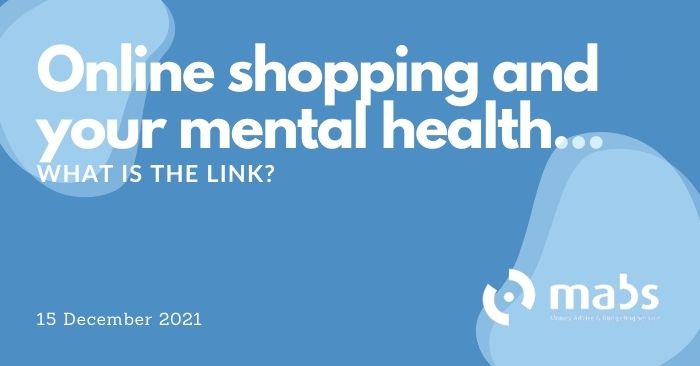Online shopping and your mental health…what is the link?

The past 2 years have seen us all change our habits in one form or another. One of the habits that are becoming increasingly popular is shopping online. Shopping online, sometimes called eCommerce, increased in the last 2 years due to more businesses going online to compete. The move by businesses to create online shops became even more important as COVID-19 public health restrictions meant that some businesses had to close their doors to the public.
Adapting in a time of uncertainty
When it comes to our mental health, we adapt as much as possible. Still, many of us will experience mental health difficulties due to loneliness, isolation, stress, fear and financial worries, among other things. Those experiencing hardship might see online shopping as an outlet, a link with the outside world and a form of socialisation.
It is important to remember that online shopping can become a problem, particularly for those with mental health difficulties. Symptoms of many common mental health problems can make it challenging to control spending – being aware or conscious of these will help you.
Our brains release endorphins and dopamine when shopping online, sometimes called feel-good hormones. These hormones provide a momentary ‘high’ that makes us feel good and lets us forget about our personal challenges for a while. And with online shopping, you not only get a “high” at the time you press “buy”, but also when the delivery arrives.
Open all hours
Shopping sites make it very quick and easy to buy online. You can spend a lot of money at any time of the day or night, with just a few clicks. Options like saving payment details can make it even easier to spend your money. So easy that it doesn’t always feel like spending ‘real’ money. This can lead to spending more than you have. ‘Buy now, pay later’ services (BNPL) have become more available to Irish shoppers and make it much easier to get into problem debt. BNPL services can help to spread the cost of big-ticket items. However, they can lead shoppers into a false sense of security and encourage more spending. Being aware is one step to help you take control of your online spending. We have a helpful blog with 6 tips to help you reduce online spending.
Fear of missing out (FOMO)
Without us even realising, shopping sites use a range of behavioural nudges or tactics to put us under pressure to spend more. For instance, low stock alerts, selling quickly, limited sales, limited editions or new releases. This kind of pressure from shopping sites can cause panic, distort decision-making and drive unnecessary purchases.
Going online is an increasingly personalised experience. Lots of shopping sites offer tailored suggestions. Even once we’ve finished browsing their website, adverts can follow us across the internet. This is a key difference between online shopping and visiting the shops. If you’re online, spending is only ever a click away, even if you don’t want to shop.
During times of poor mental health, these nudges, personalised suggestions and adverts can be challenging to resist. The temporary “high” that comes with purchasing can soon be replaced by the realisation that we have spent more money than we can afford. The “high” can lead to compulsive shopping as a coping mechanism to hide emotions like stress, anxiety, and low self-esteem. Not being able to control your shopping can lead to feelings of shame and guilt. Excessive spending can result in problem debt or falling into arrears on your bills.
Signs to watch out for
- Difficulty resisting buying unnecessary or barely wanted items.
- Spending a lot of time researching things that may or not be needed.
- Financial difficulties because of uncontrolled shopping. This can be as simple as a bounced direct debit/standing order or a missed bill.
- Being very secretive about purchases.
- Hiding or lying about purchases or deliveries.
- Problems at work, school or home because of spending that’s gotten out of control.
You can take simple steps to help reduce your online spending before it gets problematic. Becoming aware of your “triggers” that turn you towards online shopping and reviewing your spending regularly can help you stop overspending.
Help is available – you’re not alone
There is always someone to talk to if you feel overwhelmed by mental health difficulties.
- Samaritans Freephone 24 hours a day 116123
- Pieta House Freephone 24 hours a day 1800 247 247 or Text HELP to 51444
- Yourmentalhealth.ie – HSE
- Mental Health Ireland
If you want to talk confidentially about budgeting, problem debt or general financial matters, you can call the MABS National Helpline on 0818 07 2000 Monday to Friday, from 9am to 8pm, WhatsApp 086 035 3141 or request a callback.
Disclaimer: While every effort is made to make sure this information is accurate and correct, we strongly recommend that you do your own research and make your own informed decision.
Related Topics




Facebook
twitter
Instagram